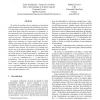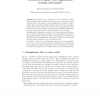674 search results - page 40 / 135 » Preferences in Game Logics |
JANCL
2007
13 years 9 months ago
2007
Qualitative coalitional games (QCGs) were introduced as abstract formal models of goal-oriented cooperative systems. A QCG is a game in which each agent is assumed to have some goa...
IDEAS
2003
IEEE
14 years 2 months ago
2003
IEEE
The objective of this paper is to investigate the problems related to the extensional integration of information sources. In particular, we propose an approach for managing incons...
DIMACS
1996
13 years 10 months ago
1996
in Structure'95. 14] R. Fagin. Easier ways to win logical games. In Proc. DIMACS Workshop on Descriptive Complexity and Finite Models, AMS 1997. 15] R. Fagin, L. Stockmeyer, M...
QEST
2008
IEEE
14 years 3 months ago
2008
IEEE
We tackle the problem of non robustness of simulation and bisimulation when dealing with probabilistic processes. It is important to ignore tiny deviations in probabilities becaus...
LPAR
2004
Springer
14 years 2 months ago
2004
Springer
We propose a new parameter for the complexity of finite directed graphs which measures to what extent the cycles of the graph are intertwined. This measure, called entanglement, i...


